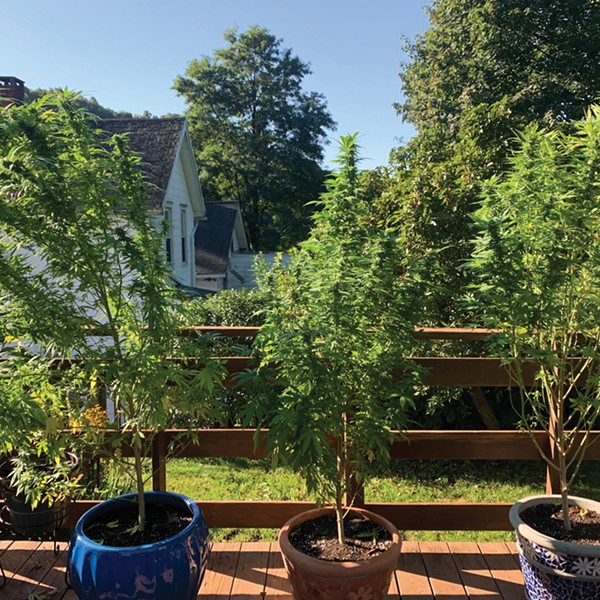When you’re flat, you’re busted, you’re totally broke, when the ATM eats your card for a joke, when you’re out of cash, out of credit, and have no more hope, what do you do? You take to the streets and start selling dope.
It happens in the hood and out in the ’burbs, see them hangin’ and slangin’ out by the curbs, cars cruise by making the scene, down by the mall and out on the green. It happens to the lowly, it happens to the high, when the river of money abruptly runs dry.
It happens to the quick and those who hesitate, and now it has happened to our very largest state.
California, O California, always on the cutting edge, now you are standing on a fiscal ledge. California, O California, always ahead of the scene, is thinking of going really, truly green. The only way out of their deep financial grief is at last to turn to our special sacred leaf. In this crisis so full of rants, tears, and sighs, the only escape is to legalize. To cover the shortfall, fill in the cracks, send muggles to market, and collect the tax.
California has a unique referendum system. Anyone can propose a law.
For $200 and with the signatures of 5 percent of voters who voted in the most recent gubernatorial election, a referendum can get on the ballot to become a law. With 8 percent, it can go on the ballot as a constitutional amendment.
In 1978, California voters passed Proposition 13 as a constitutional amendment.
Prop 13 limits real estate taxes to 1 percent of the cash value of the property. The baseline for such values was set at 1975 prices. Increases in valuation are limited to 2 percent a year, except when a property is sold, at which time the sale price establishes a new value.
Prop 13 also requires a two-thirds majority in the state legislature and in local legislatures to increase other taxes, including sales taxes and income taxes. Even at its most liberal moments, California has a large, significant, and immovable conservative minority. Passing tax increases is impossible, as Governor Schwarzenegger, like all the governors since Ronald Reagan, has discovered.
Prop 13 was, and remains, hugely popular. It was also hugely influential. Since then, tax cuts have become our national theme song and tax hikes have become almost impossible anywhere.
At the same time, costs don’t go away. If anything, they continue to increase.
With the Crash of 2008, which has continued as the recession of 2009-10, tax revenues in all states have fallen sharply. States search frantically for compensating cuts, but their costs include things that can’t be cut for practical reasons, for political reasons, or because they are mandated by other state laws, federal laws, or the courts.
In 1996, California once again led the way and passed Prop 215 (55.6 percent in favor, 44.4 percent against), which legalized the medical use of marijuana. There are now 14 states where medical marijuana is legal. The closest to us are New Jersey and Vermont.
Marijuana, for any purpose whatsoever, remains illegal under federal law.
The Bush Administration had the DEA raid medical marijuana distributors, and make arrests, and had federal prosecutors send people to prison even when they were operating under contracts with California municipalities and in compliance with state law.
In October 2009, Obama’s attorney general, Eric Holder said, “It will not be a priority to use federal resources to prosecute patients with serious illnesses or their caregivers who are complying with state laws on medical marijuana”—this was taken to mean that they would not prosecute – “but we will not tolerate drug traffickers who hide behind claims of compliance with state law to mask activities that are clearly illegal,” which has been taken to be requisite, tough-on-crime, law-and-order rhetoric.
Several states and individual localities, departing from their state statutes, have decriminalized possession of marijuana. In New York, “possession of 25 grams (.88 ounces) or less of cannabis is a civil citation punishable by up to a $250 fine and a $100 court surcharge; stricter punishments exist for sale, cultivation, or subsequent offenses. If found in a public place with marijuana burning or in public view, offender can be charged with a misdemeanor, fined $500, and incarcerated up to 3 months.” (Source: State by State Laws: New York. NORML. 2006.)
“First-time offenders of all marijuana possession laws and some marijuana sale laws are, with some exception, granted an automatic adjournment of their case in contemplation of dismissal (‘ACD’), meaning that if the offender commits no crimes and abides by any conditions set by the court, his or her case will be automatically dismissed after six months.” (Source: New York State Criminal Procedure Law Section 170.56. Laws of New York. 2009.)
In short, we now have a hodgepodge of legality, illegality, draconian penalties, and minimal penalties, depending on where you are and who happens to catch you.
The next step is legalization. In March, supporters of such an initiative got enough signatures to put it on the California ballot for this November.
There are lots of reasons to legalize marijuana.
First of all, there is not much cause for it to be illegal. It doesn’t seem to do much harm. Okay, it tends to make some users fat and stupid. But not nearly so much as watching television or eating fast food. It may make some people a little crazy, but inertly so. They just lie there with their headphones on.
It certainly doesn’t kill anyone, while many legal drugs do.
Deaths Caused by Drugs in the US Annually
Tobacco: 400,000
Alcohol: 100,000
All Legal Drugs: 20,000
All Illegal Drugs: 15,000
Caffeine: 2,000
Aspirin: 500
Marijuana: 0
Nowadays, lots and lots of people do it. Prosecution is necessarily selective and arbitrary. Indeed, so many people do it, that even with 840,000 arrests, as there were last year in the US, use just continues to increase.
The big argument for legalization is this:
“Legalizing marijuana would save $7.7 billion per year in government expenditure on enforcement and prohibition. $5.3 billion of this savings would accrue to state and local governments, while $2.4 billion would accrue to the federal government.
Marijuana legalization would yield tax revenue of $2.4 billion annually if marijuana were taxed like all other goods and $6.2 billion annually if marijuana were taxed at rates comparable to those on alcohol and tobacco.”
(Source: “Budgetary Implications of Marijuana Prohibition in the United States,” The Marijuana Policy Project.)
It’s on the ballot, it’s up for a vote, better write it down, better make a note, two thousand ten, in month eleven, turn the Golden State into stoner heaven. You owe it to Cheech, you owe it to Chong, to your beautiful mind, and your beautiful bong.

















